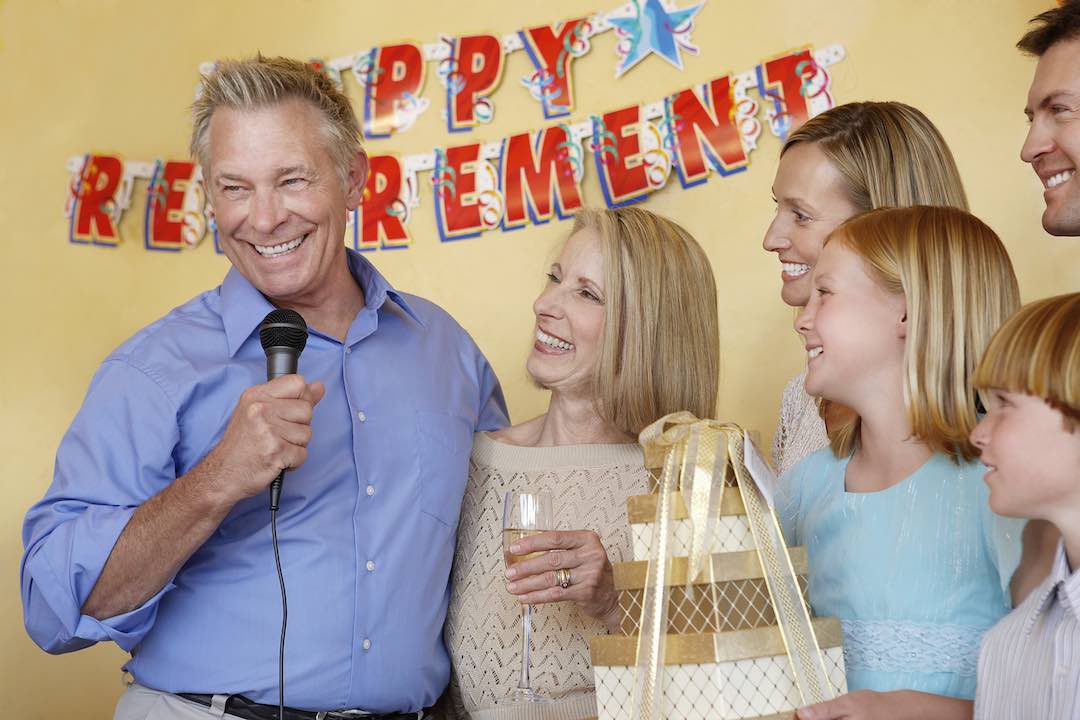Warning: Undefined array key 1 in /var/www/wp-content/plugins/monarch/monarch.php on line 4359
Woohoo, it’s here! You’ve been working hard all these years, and it’s time to begin an exciting new chapter. There’s just one more task in your inbox… to give an unforgettable retirement speech at your farewell dinner.
Ugh.
Giving a speech, the last thing you want to do… but in fact, it’s the last thing you have to do for work. (And there’s an opening line you can use!)
While most people are uncomfortable if not outright terrified of public speaking, and even more so when it comes to talking about themselves, breaking the ice with a funny one-liner helps you relax and settle into your speech.
6 Rules To Help You Prep For Your Retirement Speech
The biggest question many people have is: “What should I talk about?” Specifically… should you just recap your career or somehow make it an inspiring talk about what’s next… is it okay to make fun of the boss… is this the right time to give advice to your successors… how much is too much…?
Relax. Retirement speeches don’t have to be boring or preachy! Think of your speech as a farewell gift to a great group of people with whom you’ve shared so much of your life.
Writing a great retirement speech is all about asking yourself one question:
“What stands out for me as I look back at X years working for this company?”
1. Be Brief
Everyone is there to celebrate your retirement, and they want nothing more than to socialize with you and make you feel good about this important transition. They don’t want to hear a detailed synopsis of your entire career. Just mention important milestones and anecdotes, thank notable people, and briefly let folks know what’s next on your horizon.
2. Be Grateful
Whatever your overall experience at work, there are always things to be grateful for and nothing is classier than expressing gratitude for what you’ve learned, the friendships you’ve made, and the opportunities you’ve had.
3. Connect with Your Audience
It can be challenging to relate to everyone in your audience if your team is made up of 20-somethings new to the job (who can’t relate to retirement), 40-somethings in the prime of their career (who are working their tails off and may feel a pang of jealousy that your 60-hour workweeks are over), and soon-to-be retirees (who are curious about what you’re going to do and if it sounds as much fun as what they have planned).
So what connects people? Stories. Stories are inspirations, but they are also lessons without the preaching, and people love them.
- Recall early memories (“My first day on the job, I almost quit because…”)
- Share funny anecdotes about technology that has changed (“Remember ditto machines and floppy discs?”)
- Remember people who were pivotal in your career (“I’ll never forget that day I was having a meltdown because I lost us a huge client, and I hear this knock on the door and it’s X…”)
- Share funny stories of mistakes you made and lessons you learned the hard way (“It seemed like a good idea at the time…”)
4. Be Humble, and Be Nice
Never boast about your accomplishments or make jokes at the expense of your old boss and co-workers.
Who made your job easier? Who taught you the most? Whose brilliant idea saved the day? People will appreciate it when you acknowledge them. Accomplishments are a team effort and the whole team deserves to be recognized. Naming people who made your career a success, thanking your co-workers and boss, and remembering support staff will make a great last impression. Also, remember to publicly thank your family and friends for their support and friendship.
5. Tread Delicately
A retirement speech shouldn’t be about “Haha, you have to go to work tomorrow and I get to jet off to Hawaii.” It’s about making people feel positive about the future at the company without you there. Express sadness about leaving: how much you’ll miss the everyday banter with your team, the satisfaction of overcoming obstacles together, and how you’ll miss sharing the thrill of accomplishment for a great team effort. Don’t dwell too much about your next steps. Instead, focus on making people feel that they are an important part of the organization – as you were – and that you wish them (and the company) well.
6. Be Yourself
You don’t have to crack jokes throughout your whole speech. Just talk normally. Be yourself. To help you relax, open with a joke and then transition into your stories. There are plenty of retirement jokes out there you can use as speech starters to help break the ice.
“For a long time, it had seemed to me that life was about to begin-real life. But there was always some obstacle in the way, something to be gotten through first, some unfinished business, time still to be served, a debt to be paid. Then life would begin. At last, it dawned on me that these obstacles were my life.” ~ Alfred D. Souza
“The good news is that I’m only going to make one retirement speech, and this is it.”
“Today reminds me of the time when Governor Swanson of Virginia made a long and rambling speech. Afterwards, a woman came up to him to shake his hand. ‘How did you like my speech?’ he asked. She answered, ‘I liked it fine, but it seems to me that you missed several excellent opportunities.’ Swanson was puzzled. ‘Several excellent opportunities to do what?’ ‘To quit she replied.”
Practice
Once you’ve made some notes on what to say, start practicing even if the speech hasn’t come together yet. Put a few key points on index cards to help you stay on track, and start talking. You’ll find that the first few practice sessions are awkward, but you’ll flesh out your speech with more stories, and you’ll improve the flow as you become relaxed about what you’re saying.
Before you deliver the speech, practice your talk aloud in front of someone who will give you honest feedback.
Retirement is a special occasion that marks the finale of a long and successful career and it’s often an emotional situation – for this reason, try to keep your speech as upbeat as possible while expressing your feelings in a genuine way.
Happy retirement!
I’m a self-professed madman, adventurer, photographer, certified High-Performance Coach, martial artist, and licensed physical trainer specializing in senior fitness. My passion is to continue growing and developing into my own unique, gifted, and joyful authenticity, while committing myself towards doing my own special part to help change the world. My mission is to help others find their own direction and purpose in life, by means of mentoring, teaching, and empowering.









